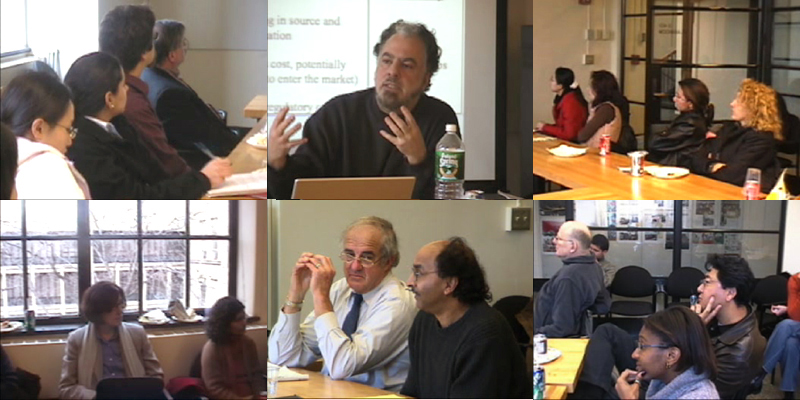 |
Massachusets Institute of Technology
Department of Urban Studies and Planning
2003 MIT-DUSP Seminar / Speaker Series on |
Check :
Seminar at MIT 2023 |  |
Friday's lunch - Fall 2003
LAST SESSION: Friday, 12 December 2003
12-14.00 PM, room 3-401
with e-Planning Seminar
"Synthesis and Review: Where to go from here?"
Issues raised and major areas of inquiry
Suggested methodologies and approaches
Next steps that make sense for DUSP
| The e-Planning Seminar guests and DUSP discussants brought us many issues and conceptual challenges.
Did it contribute to a "better world-wide view and understanding of the current major issues and corresponding leading research on urban information systems (UIS) / information technology uses and impacts in planning" ? What major areas of inquiry did we identify?
What are the next steps that make sense for DUSP?
[see more details] |
| Moderators: Pedro Ferraz de Abreu, Joseph Ferreira Jr.; Suggested discussants (tbc): e-Planning Seminar students Claudia Canepa, Laura Colini, all past DUSP faculty discussants, and Meghan Fennelly (overview of IT-related DUSP work) |
Schedule: Fridays, lunch hour (12 - 14 PM, Talk: 12.15-13.45 PM), room 3-401 (or Stella, TBA) ; Lunch registration: rsvp to Sue Delaney ; Dates: 19 September 2003 to 12 December 2003
Speaker Series Chair: Pedro Ferraz de Abreu
Faculty Advisory Committee (at this time): Larry Vale, Joseph Ferreira, Ceasar McDowell, David Laws, Diane Davis, John De Monchaux, Lorlene Hoyt, Phil Thompson, Ralph Gakenheimer
Related Course: 11.950 "e-Planning Seminar" , T 6-7.30 PM, room 9-554 (Instructor: P. Ferraz de Abreu)
Calendar
| Date | Title |
Presentation | Discussants |
| 19 September 2003 |
Introduction to the "e-Planning" Seminar |
Pedro Ferraz de Abreu | Joseph Ferreira Jr., Ceasar McDowell, David Laws, Jane Fountain, John de Monchaux, Larry Vale |
| 26 September 2003 |
"Local Institutional Innovation and e-Planning" |
Thomas Kingsley | Charlotte Kahn, Joseph Ferreira Jr. |
| 3 October 2003 |
"e-Planning for urban and regional transportation: examples from France, US and China" |
Peter Cook | John de Monchaux |
| 10 October 2003 |
"e-Democracy: enabling, engaging, empowering" |
Ann Macintosh, UK | Phillip Thompson, Jane Fountain |
| 17 October 2003 |
"From Neighborhood Knowledge to a National Community Information Infrastructure: Examining Emerging Planning Tools" |
Neal Richman | Lorlene Hoyt, Ceasar McDowell, Mel King |
| 24 October 2003 |
"From Border-Busting to Ubiquitous Computing: Some Social, Cultural and Policy Implications of Recent Changes in Information Technology" |
Gary Marx | Diane Davis, Keith Hampton |
| 31 October 2003 |
"e-Planning: Qvo vadis, MIT-DUSP?" |
Diane Davis, Jane Fountain, Phillip Thompson, Joseph Ferreira, John de Monchaux, Zhong-Ren Peng | Students |
| 7 November 2003 |
"The Multiplier Effect: Using GIS to Build Planning Capacity" |
Christian Jacqz | Suggested DUSP faculty: Terry Szold, David Laws, Ralph Gakenheimer |
| 10-12 November 2003 |
"International Conference on Public participation and Information Technologies" |
ICPPIT03, co-organized by DUSP and CITIDEP | Location: MIT 66-110 |
| 14 November 2003 |
"e-Planning and citizen participation : limits, illusions and potential" |
Bernard Marchand | DUSP faculty: Bish Sanyal, Langley Keys |
| 21 November 2003 |
"Managing Complexity, or the Information Needs of Adaptive Co-Management: The Durham NC air quality case" |
Kathi Beratan | David Laws, Herman Karl |
1 December 2003
(MONDAY) |
"Multimedia and Public Participation: Using New Information Technologies in
Urban Regeneration" |
Mike Batty, UK | Co-sponsored with SPURS
Suggested DUSP faculty: Denis Frenchman, Anne Spirn, Ralph Gakenheimer |
| 5 Dec 2003 |
"e-Planning in a world embattled by war and poverty:
Why should planners study and influence the information technology revolution?" |
Pedro Ferraz de Abreu | Discussants: Bish Sanyal, David Laws, Judith Tendler |
| 12 December 2003 |
"e-Planning Seminar
"Synthesis and Review: Where to go from here?" |
DUSP faculty | Linda Kim, Claudia Canepa, Laura Colini, other e-Planning Seminar attendees |
e-Planning
1. Introduction
DUSP Seminars on Technology and the City have contributed to understanding the urban planning implications of modern information and communication technologies (ICT). The new Seminar / Speaker Series on "e-Planning" builds on this experience and focuses on the new challenges and opportunities for ‘e-planning’ as the reach of ICT extends far beyond the automation of traditional tasks. This Seminar is a "department wide" endeavor, intended for faculty and students of all DUSP research clusters and specialization areas.

2. Towards a research agenda on e-Planning
In the last few years, e-government efforts have become fashionable both in the US and abroad.
Initially, we saw a multitude of independent initiatives towards improving the use of ICT in public services and public administration, mostly focused on using the Internet to facilitate information access and automation of services. More recently, the trend has been toward centralization and consolidation of e-government efforts and, in some cases, a restructuring of the agencies involved. We are now beginning to observe the emergence of central plans and central authorities, or even multi-national regional plans and agencies, which reach far beyond the traditional government IT branches, and are developing e-government strategies and policies touching all sectors in society and all branches of government.
Examples of this are: the "e-Government Task Force for Ibero-American Countries", created at the level of central ministries at the VII Ministry Summit of the 21 Ibero-American countries (September 2002); the "e-Europe" initiative, launched by the European Commission in 1999, and adopted as policy by the European Council Summit in Lisbon, March 2000, requiring "public administration at all levels to use new technology to give public access to information for all citizens, promoting, at the same time, on-line interaction among citizens and public administration" (e-Europe 2002 Update, 2000). In the USA, there are no less significant investments, reflected for instance in the NSF-funded "Digital Government" program and the US Federal governement’s restructuring efforts (the Vice President Gore’s ‘Reinventing Government’ project and the ‘E-Government Initiatives’ of the current Office of Management and Budget).
As expected, these "e-Government" efforts are impacting planning and setting the agenda for what might be called ‘e-Planning’. Such a trend is forcing planners to look beyond the (relatively) simple and obvious examples of service automation or public access to government information. One leading example is the "e-planning Group" fostered by Scottish Executive (September 2001). In his document "e-Planning: Turning the Organization Inside Out", Peter Thorpe writes:
"The ‘Modernizing Government’ Agenda has set a target for Planning Departments, like other Government organizations, to ensure that 100% of their dealings with the public are capable of being undertaken electronically by 2005.
This places the onus on Planning Authorities to rethink the way that their services are organized and delivered" (Thorpe, P. University of Exeter, Planning Summer School 2001, UK)
In effect, will the centralized services move beyond efficient publishing and broadcasting in ways that promote meaningful dialogue among citizens and public/private interests? Shouldn’t e-planning differ from e-government in that improved planning processes might involve many partners and less government?
This evolution raises many new questions that go beyond re-shaping services.
The trend towards a more central role of technology in Government and in Planning has come, somewhat paradoxically, as the technologies have greatly enhanced the prospects for disaggregated, spatial analyses and decentralized, community level planning. Reduced cost and improved technology has stimulated the rapid expansion of detailed, disaggregated data about land use and ownership, geography, infrastructure, environmental conditions, etc. along with new, sophisticated analytical tools and visualization techniques to make the best use of them.
This dual trend poses new intellectual challenges at community/neighborhood as well as city/global levels, and it raises research questions on a breadth of issues, with emphasis on Public Participation, Privacy, Security and Freedoms, Institutional reform, and Environmental Planning. Furthermore, its study requires considerable knowledge and understanding of ICT’s potential, not only of hardware and software, but also of powerful analytical tools, data mining, and communication strategies.
Technology is bringing to the table a new wealth of data and parameters, at multiple levels, that were not available to planners before. Besides the well known issues of data filtering and evaluation, how does this data availability impact planning processes, levels and scope? How does it relate to the emergence of "neighborhood planning"? Can ICT facilitate de-centralization of urban revitalization and development efforts? Will it enable new forms of measuring the "performance" of a City, and of City Plans? Will these measures benefit ‘outside’ regulators and funders or ‘inside’ residents and community organizations?
Technology is also the focus of attention in a world troubled with increased levels of insecurity and conflict / competition. How can Planning and IT contribute to a better grasp of the trade-offs among issues of security, human rights and freedoms? What are the new threats to privacy posed by the level of detail and accuracy of data collected in planning procedures and policy implementation?
Technology is facilitating citizen access to information at levels never experimented before. But this new trend towards government centrality, and IT business consolidation, may inform citizens without empowering them. What forms of public participation in decision-making are sought, enabled or deterred by the new policies? Are current technology development policies favoring citizen participatory models, or pushing back citizens to a consumer role?
Technology is rapidly changing the public administration landscape. How is it impacting institutions and regulations? Is the new technology challenging the current institutional and regulatory framework for plan-making and urban development? What are adequate paths towards institutional and regulatory reform?
New challenges in Planning, with or without an "e", cannot be understood separated from the challenges faced by the people that embody it. What is the role of a planner in this new scheme, between e-Government oriented policies and increased citizen pressure towards interactive planning? What new technology and analytical skills and competencies are required for the new generation of planners? How can we improve our current school curricula to correspond to these new requirements?
The MIT Department of Urban Studies and Planning has been at the forefront of the new thinking concerning the use of technology by planners and the impacts of technology on planning. Examples include our research on GIS web services, neighborhood information systems, and collaborative planning tools, and our use of these technologies to study urban spatial structure, community development, social capital formation, digital divide issues, and urban design methods. We must continue to provide leadership by fostering a research agenda on the next generation of problems facing "e-Planning".
One goal for this Speaker Series Seminar is to advance the research on Planning and ICT at DUSP. The topic has long been the focus of the Planning Support Systems research cluster. But the expanded ICT use and the far reaching implications of ICT choices and strategies have brought one or another aspect of ICT onto the agenda of all groups across DUSP. The seminars are intended to facilitate dialogue across a broad cross-section of the department about some of the shared issues, methods, and implications of "e-planning". By doing so, we also hope to stimulate debate about an e-planning research agenda among an international community of our peers, not only in Planning but also in closely-associated fields. Hence the planned Book as a result of the Series, incorporating MIT-DUSP contribution to the new intellectual challenges we face today, and the International Conference (ICPPIT03) complementing the Speaker Series.

2.Speaker Series Topics:
A- Breadth
1) Community level: e-Community Planning
Neighborhood Information Systems
Community Statistical Systems
E-Neighborhoods
Community Empowerment
2) City level: Enhancing City Performance
City Knowledge and Meta-Knowledge
Measuring and Monitoring City Activity and Performance
Learning about Cities through IT
The IT infrastructure for City-level e-Government / e-Planning
3) Global level: The Fading Borders between Regional, National and Local Planning
e-Government and e-Planning: new inter-dependencies between national, regional and local plans
e-Planning in a world with a variable geometry of development and unbalanced globalization
e-social movements and multi-level impacts
Informal governance and challenges to land-based sovereignty
B - Issues
1) Public Participation
Technologies of Communication for citizen empowerment
Technologies of Knowledge for responsible citizen participation
New citizen responsibility with de-regulation
New role of the planner in governance
2) Privacy, Security and freedoms in the e-World
Planning, IT and the trade-off between security and freedom
e-data vulnerability and free flow of information
New e-manipulation and metadata standards
Location-based services and data access: (Big-brother vs. efficient monitoring)
Preserving individual rights
(free circulation of information vs. protection from bad uses of that information, safety in travel and accessing city space vs. citizen mobility, privacy in communications - Internet, voice, etc.).
3) Urban Modeling and Urban Design
The implications of transparent models and increasingly ‘sensed’ urban spaces
The changing economics of place
Who benefits from GIS and spatial analysis
The geography of change in the e-World
New spatial relationships (e.g., e-abutters)
Facilitating the sharing of planning models and data
4) Environmental Planning
Citizen participation with new IT in Evironmental Impact Analysis
e-planning for new energy and transportation policies after Kyoto
The impacts of EnviroMapper as a public information strategy
Spatial analysis and environmental justice
5) Institutional Reform
(the emergence of new frameworks with real impact in planning and governance, both formal and informal).
Planning in the knowledge-based society
e-Accountability
Shifts of decision centers in e-Government
IT challenges to hierarchy paradigms in public administration

3. Book on "e-Planning":
The "e-Planning" Speaker Series will lead to the publication of a coherent book, with a significant contribution from MIT and DUSP to the field, together with a selected body of major researchers from other institutions.

4. International Conference (ICPPIT03):
Having in mind promoting opportunities for young researchers with interesting and innovative approaches to play a more visible role in the process, it is very useful to complement the Speaker Series, targeting a focused Book, with an International Conference, with an open call for papers (with referee selection nevertheless), targeting a specific "Conference Proceedings" publication.
Given the success of the overlapping theme of the CITIDEP/UNL-organized 1999 International Conference on "Public Participation and Information Technologies" (ICPPIT99), MIT-DUSP and CITIDEP are co-organizing the 2003 edition of this Conference (ICPPIT03). While the first program reflected its association with a Dept. of Environment Sciences and Engineering (co-organizer with CITIDEP of ICPPIT99), with an important component of environmental-related communications, ICPPIT03 program reflects its association with MIT and DUSP, with an important component of planning-related topics.
ICPPIT03 (with corresponding proceedings publication) will be a joint MIT-DUSP and CITIDEP edition.
References:
Ferraz de Abreu, P. & Ferreira Jr., J. (2003), "Towards a Research Agenda on e-Planning", MIT-DUSP
Ferraz de Abreu, P. and Joanaz de Melo, J. (eds (2000) Book "Public Participation and Information Technologies 1999", CITIDEP - UNL-FCT, 600 pages. [order | aquisição]
Ferraz de Abreu, P. (1993), "Towards a Definition of Information Systems in Planning", MIT-DUSP
ICPPIT03 web url: http://web.mit.edu/uis/icppit03/ and http://www.citidep.net/icppit03/
CITIDEP (Research Center on Information Technologies and Participatory Democracy): http://www.citidep.net/

original site: http://web.mit.edu/dusp/uis/e-planning/



